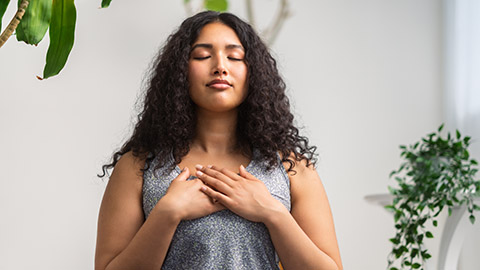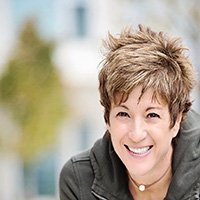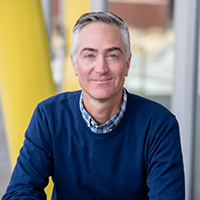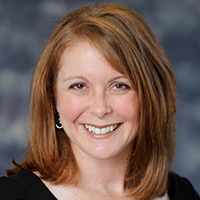
Despite the chaos of our cultural predicaments, you can learn to live beyond your busy mind and experience more “on” days—days where you are in flow. In this episode of The ABMP Podcast, Kristin and Darren are joined by Cara Bradley to discuss mental fitness and keeping a clear mind, strategies to help guide our thought process, and how the gut-brain connection directly impacts our mental health.



Anatomy Trains:www.anatomytrains.com
PurePro: www.purepro.com
Touch America: www.touchamerica.com
Anatomy Trains is a global leader in online anatomy educationand alsoprovides in-classroom certification programs forstructuralintegration in the US, Canada, Australia,Europe, Japan, and China, as well as fresh-tissue cadaverdissectionlabs and weekend courses. The work of Anatomy Trains originated with founder Tom Myers, who mapped the human body into 13 myofascial meridians in his original book, currently in itsfourthedition and translated into 12 languages. The principles of Anatomy Trains are used by osteopaths, physical therapists, bodyworkers, massage therapists, personal trainers, yoga, Pilates,Gyrotonics, and other body-minded manual therapists and movement professionals. Anatomy Trains inspires these practitioners to work with holisticanatomy in treating system-wide patterns to provide improved client outcomes in terms of structure and function.
Website:anatomytrains.com
Email:info@anatomytrains.com
Facebook:facebook.com/AnatomyTrains
Instagram: www.instagram.com/anatomytrainsofficial
YouTube:https://www.youtube.com/channel/UC2g6TOEFrX4b-CigknssKHA
Pure Pro Massage Products
From the start in 1992, Pure Pro has distinguished itself by adhering to its values of quality, purity, efficacy, and education.
Pure Pro knows that discerning massage therapists deserve high-quality products that perfectly support and enhance healing work. Pure Pro Massage Products are created by massage therapists for massage therapists and bodyworkers who care deeply about the quality of their massage products.
Pure Pro products are nut-free, gluten-free, cruelty-free, and made with natural ingredients in the USA. Pure Pro’s full line of oils, creams, and Arnica lotion has everything you need for your favorite modality and will always leave your clients’ skin feeling clean and fresh after each treatment.
Listeners can receive $10 off their next order of $59 or more at PurePro.com by using promo code ABMPPOD.
Website: www.purepro.com
Email:info@purepro.com
Facebook: https://www.facebook.com/purepromassageproducts
Instagram: https://www.instagram.com/purepromassageproducts/
YouTube: https://www.youtube.com/channel/UCncpFzRVwZA_V_SnylkHyMw
TouchAmerica is a leading manufacturer of professional grade wellness furniture, bodywork tables, halotherapy suites, hydrotherapy equipment, sound bathing loungers, and other related products. At TouchAmerica, we believe in a future where good health and vitality are common in all aspects of living. Promoting the positive power of conscious touch is at the core of our vision. We hope our products help add a touch of functional elegance to your massage & spa work environment. ABMP members receive 20% off all standard products. Discounts do not apply to salt or special-order SKUs.
Visit https://www.touchamerica.com/ or Call 800 67 TOUCH and use code touchABMP*.
Reach out today and feel the TouchAmerica difference!
0:00:00.0 Kristin Coverly: Are you interested in upgrading or adding a new treatment table or amenities to your business? Consider purchasing your next piece of equipment from TouchAmerica, a family-owned manufacturer of bodywork and wellness equipment. Utilize the 20% off code found on ABMP's member discount page, abmp.com/discounts, by calling us at 800-67-TOUCH or visit touchamerica.com. Reach out today and feel the TouchAmerica difference.
0:00:42.6 Darren Buford: I'm Darren Buford.
0:00:45.2 KC: And I'm Kristin Coverly.
0:00:46.7 DB: And welcome to the ABMP podcast, a podcast where we speak with the massage and body work profession. Our guest today is Cara Bradley. Cara is a leading authority of mental fitness and shares her signature body mind training with Fortune 500 companies and professional sports teams. She authored, On The Verge: Wake up, Show up and Shine, founded Verge Yoga Center, and is host of Daily Whispers Podcast. Cara was named a top 12 most powerful woman in the mindfulness movement by Mindful Magazine. For more information visit carabradley.net. Hello, Cara and hello, Kristin.
0:01:22.5 Cara Bradley: Hey, it's so good to be here. Thanks so much for having me on.
0:01:24.6 KC: We're thrilled to have you on. Let's jump right in. Cara, your driving passion is mental fitness. So we're gonna talk to you today about your book and about another interest of yours, the gut-brain connection, and how all of these concepts work together to help someone improve their mental fitness and overall health. So let's start at the very beginning, at the core. How do you define mental fitness?
0:01:49.4 CB: It's a great question, and there's so many different definitions out there. I've been using this term for a while because I've been in the fitness and wellness world my whole career. And I started to, as a meditation teacher, I started to notice that people were getting this kind of glassy, glossy-eyed look when we talk about mindfulness. And so I started to just put it in terms of physical fitness, how we understand now how to train our bodies and how we need to cross-train and do all kinds of recovery techniques for our body to be healthy and the same thing for our mind. So the way I define mental fitness is when our body and minds are synchronized and working together in synergy, we have this feeling of being strong, calm and clear. And really it is the essence of being in a flow state. When we feel incoherence, in balance, in harmony, there's so many ways to put it, but for me, mental fitness is strong, calm, clear.
0:02:50.1 DB: Cara, in your book, you write about the importance of having a clear mind, bright body and open heart. Can you tell us a little bit about those concepts?
0:03:00.7 CB: Yeah. Oh, boy, that book took a lot out of me.
0:03:00.9 KC: It sounds so simple. Clear mind, bright body, open heart.
0:03:05.7 CB: And it sounds so simple, but is it really? And it comes back to what I just said. I have been fascinated with the body-mind connection. And I say body-mind instead of mind-body because I do believe, as I'm sure a lot of your listeners also understand that our biology is driving so much of our psychology. So when the body is in balance and synchronized and feeling supple and strong and all those things that we hope to feel, our minds feel open and calm. So it is this idea of bright body, open heart, and clear mind is working in synergy with these different aspects of our body. We can't just look at one aspect of our health and wellness and expect everything else to fall into place. We really need a very holistic view. And that's why I break it down like that.
0:04:00.0 KC: I love that, Cara. And in your book, you not only talk about these principles, but you give people action steps and tools to use. So one of the groups of things you include are four verge practices, things we can do each day to wake up to our direct experience of being fully alive. Can you walk us through one of those practices?
0:04:20.5 CB: Yes, and these practices are so, again, very simple and obvious and common sense, but so often we step over what's right in front of our nose. And so I like to, as a teacher, continue to repeat, repeat, repeat the obvious, the simple, and often the free, to be honest with you. So one of the practices that I love is this idea of having a handful of notes to self. Notes to self are simple reminders to be aware. So my whole book is a pointing out of recognizing our direct experience of our natural state of aliveness. And so all of these practices, there's no magic to it. It's really bringing us home back to the verge. And I'd love to explain what the verge is because I use that in a lot and have used it in a lot of my work, but bringing us back home to where we have that sense of aliveness, where we feel that open heart, right body and clear mind. So notes to self are simple toolbox of pithy reminders for yourself. And it could be as simple as being your own coach and talking to yourself like you would a child or your pet. You know, come on, we got this. You know, when you're talking to a little kid, you know, there's a pep in your step and an excitement in your voice. And so we want to start to change the way that we speak to ourselves because that hits our nervous system differently than if we're barraging ourselves all the time.
0:06:08.1 CB: So I love these notes to self. I put them on a reminder, you know, on my phone, just... And I laugh all the time at them. You know, some of them are just, you got this, you got this or yes, you can. It's something I would say often as a yoga teacher, I would just remind students because I knew that moment when they probably want to bail and I would just be a reminder in their ear. And we can do that for ourselves if we believe, and this is a biggie like we have to have trust here, if we can believe that the body mind unit... Our body's intelligence is always seeking balance, so if we can believe that it works to have that positivity streaming through our nervous system, then we'll start to come up with more and more of these practices. And I know that's a long-winded way of saying, have a bunch of tools in your tool belt to keep yourself on the positive. Catch yourself when you're going into inner critic, into that really that kind of zone where it's not helpful and not supportive.
0:07:16.8 CB: So that's one of the practices. The other three is about moving your body, which we all know, but I speak about it in very simple terms, meeting your mind and really understanding and becoming familiar with your mental patterns. Becoming familiar with is the way that we define meditation in different types of Buddhism. In meditation, it really just means become familiar with. So we want to meet our minds and become very familiar with the thought patterns and the repetitive thoughts and all of that. And so they all kind of work-hand in-hand.
0:07:57.4 KC: Cara, tell us about the term verge and On The Verge and why you chose that as the title for your book.
0:08:04.1 CB: So I have been enamored with human potential ever since I was a teenager. I was a figure skater and an athlete. I was a runner and I wasn't that good. I have to tell you, I was mediocre at best, but I was always intrigued with how to get better. And I had some glimmers of flow states during my teens when I did crush it, when I was above and beyond my expectations. And that really opened my mind to the fact that there's a lot more in us than we give ourselves credit for that we can even imagine. So I've always been looking at how do humans flourish? I mean, I wasn't using that word, but how do we do our best? And my husband had spent some time in the Ecuadorian rainforest. And when he came back, and this was right when I was thinking about opening a yoga studio, when he came back, he was just casually telling me about his trip. And he told me that he spent some time with indigenous communities there, and they would take their dugout canoes and they would go down on all the little tributaries.
0:09:11.4 CB: And they'd often stop at these special points on the river. They were revered as sacred points, and they called these points, the verge. It's where it's converged. It's where tributaries come together. It's where ecosystems come together, edges, boundaries, whatever you can imagine, a cliff is a verge. And so I started to look into this because he said that these verges were revered as sacred because it's where animal life and wildlife flourish. It's where animal life and wildlife are at their most diverse and most plentiful. And I thought immediately, I blurted out loud, I said, "Oh my God! I want to be on the verge. I want to live. Where's the verge? Where's there a verge near me?" And as I started to think about it as a teacher, and as a mindfulness practitioner and all the stuff that I've done, even as an athlete, I realized this moment is the verge when we can step into fully embodied, in mind and body into this moment we are tapping into that incredible extraordinary intelligence and potential.
0:10:22.4 CB: And so I named my yoga studio Verge Yoga because I wanted to create that kind of environment so students could come in and experience themselves. Not a fancy yoga practice or the fancy talk of a yoga teacher, but actually their direct experience, which comes back to my book, On The Verge, because it's about understanding what it means to just be here fully, right here, right now.
0:10:49.2 KC: Let's take a short break to hear a word from our sponsors.
0:10:53.6 KC: Anatomy Trains is excited to invite you to our latest in-person facial dissection workshop, April 10th through 14th, 2023 in Boulder, Colorado. Join Anatomy Trains author Tom Myers and master dissector Todd Garcia on this voyage of discovery. Visit anatomytrains.com for more information. Pure Pro massage products are created for discerning massage therapists who care about the quality of their lotions and creams. Pure Pro's Arnica Relief Lotion is perfect for clients with arthritis, fibromyalgia, muscle pain and spasms, and gives you the right grip and glide with a clean, non-sticky texture. Clients experience more relief and less soreness, and your own hands and arms will feel great too. All Pure Pro products are nut-free, gluten-free, cruelty-free, and made by massage therapists for massage therapists, with natural ingredients in the USA. Listeners, receive $10 off your next order of $59 or more at purepro.com by using the code ABMPPOD. Shop now at purepro.com. Let's get back to our conversation.
0:12:13.1 DB: So let's say we have our best intentions to being in the direct experience of being fully alive, but what about when things go south? You set the morning up really well. And the only reason I mentioned that is, I have a coworker this morning, who was like, "Ugh! It's already one of those days." And that was like at 8:40 this morning. So I was like, how... Is there like a course correction when something like that happens? What do you there?
0:12:33.8 CB: Oh, yeah. Well, listen, it's gonna hit the fan for all of us. And globally, collectively, individually, for sure. I have two reminders. So going back to those notes to self that I love, two great teachers. One is Pema Chödrön, and she says, "It's all raw material for waking up." It's all raw material. Every pulled muscle or dropped coffee cup or lost phone or cranky kid or cranky co-worker is raw material for us to practice. So that's a reminder I use. And then the second one is with... Tara Brach talks about this a lot, she's a meditation teacher, is a reminder to say, "This too. Oh, this too is part of the practice of my day. This too." Now, can I do that all the time? Am I successful at doing it all the time? Absolutely not. I mean, we get triggered so easily and so constantly again back to the nervous system. We are like live wires out there. So I mean, the news, just look at the news and you're pulled into the abyss of despair. I was, just a few days ago. So it's just the knowledge and the awareness of your capacity to be able to find your feet and find your ground in any situation that is at least a great step forward.
0:14:05.6 DB: Cara, you also share a four higher level verge strategies that help guide our thought processes. Can you describe one of those and how a listener might incorporate that strategy to start shifting their perspective?
0:14:16.4 CB: Yes. One of my favorites is be kind. Again, so simple. I can imagine the eye rolls right now. Of course, be kind. But are we? But are we kind? My meditation teacher, Scott McBride, taught me a beautiful practice that I write about. It is three words, there, there, sweetheart. There, there, sweetheart, are words that your grandmother or your auntie might say to you when you skin your knee or you get your feelings hurt. There, there, sweetheart. And what Scott taught me, and I've never forgotten it, I do it a lot, is you can put your hand on your heart, but if that's not your style, you don't have to. But just to speak to yourself in that kind voice, there, there, sweetheart. Yeah, this is tough. You know, there's nothing easy about what we're going through right now. There, there, sweetheart. There, there. And again, it's you're speaking, and this is something I've learned as a yoga teacher, and I am 100% sure that those listening in, you know, massage and body work have developed a way of speaking to body parts. You're speaking to the nervous system of your students and clients. There, there, sweetheart is a way of speaking to your own nervous system in that way that is settling and calm. So how can we, more than anything, just be kind to ourselves?
0:15:48.5 KC: Cara, let's shift gears a little bit, but we're still gonna stay in the realm of physical and emotional mental wellness. Talk to us about the gut-brain connection and how gut health directly impacts our mental health.
0:16:02.8 CB: Yeah, this is such an exciting time in research. What we are learning about gut health and its direct impact on our mental health is extraordinary. And I will just preface that to say I started my career in fitness, so muscles and bones as a strength trainer, aerobics teacher, moved more into the energetics with yoga, breathwork, up into the mind with mindfulness and meditation and mental strength training. Then down into the nervous system where I spent a good number of years understanding nervous system regulation and vagus nerve and all of that. And when I learned about the gut-brain connection, it was like I found a hidden basement of a house I'd been living in. I'd been living in the body and the mind and all these things. And then all of a sudden, I learned that 90% of our serotonin is produced in our gut. 70% of our dopamine and norepinephrine and GABA, all of these are neurotransmitters that are signaling up to our brain to feel good, to focus, to be motivated, to relax. All of this is happening in the gut and if our gut is imbalanced and our guts get imbalanced because of stress, poor food, pharma and toxins, those are the four main ways our guts get imbalanced.
0:17:29.5 KC: So most of us are walking around with a gut that is in what's called dysbiosis, so not balanced. That is going to go right up the chain of our body into our brain, into our mind and our perception. So for me, the huge light bulb was, "Wow, there's actually no amount of yoga or meditation or dare I even say massage and body work that will fully fix a gut microbiome." We can certainly impact it by lowering stress and cortisol and inflammation and all of that, but it just made me realize how our gut-brain health must be incorporated into our holistic regime, our routines. We can't ignore the gut and just spin our wheels, you know, meditating five hours a day.
0:18:22.3 DB: Cara, as we bring this podcast to a close, I'd be remiss if I didn't ask you about your own life as a professional athlete and then working with professional athletes. What did you learn from that experience in relation to your book and your other studies and practices that you can pass on to us normal folk?
0:18:38.8 CB: Well, I love working with athletes because they're so embodied. They have such body intelligence right at their fingertips. So I worked with two teams at Villanova University for about 15 years, men's basketball and football. And I was their mental strength coach, but I would get them on yoga mats and move them in a very simple yoga practice. I mean, when you're dealing with a 300-pound linebacker, you're not getting him into full lotus. So the movement was simple, but what was so amazing and what I learned from these athletes is that when you get them into their body, then you can help them build the mindfulness practice. But if they were sitting in a chair, these guys are not happy sitting in a chair. So I believe, and I do a lot of my mindful movement work is through the body, through movement, through mindful movement. And so I just learned so much from athletes that we are really happier when we are feeling in our body, feeling our feet grounded. And I believe that we learn so much better as well.
0:19:54.5 DB: I want to thank our guest today, Cara Bradley. For more information about the good work Cara is doing, visit carabradley.net. Thanks, Cara, and thanks, Kristin.
0:20:04.3 CB: Thank you so much. What a pleasure.
0:20:06.8 KC: Cara, it was a pleasure to talk to you, and thank you so much for sharing so much great information about how we can improve our mental and physical fitness. We appreciate you.
0:20:21.0 KC: Members are loving ABMP Five-Minute Muscles and ABMP Pocket Pathology. Two quick reference web apps included with ABMP membership. ABMP Five-Minute Muscles delivers muscle specific palpation and technique videos, plus, origins, insertions, and actions for the 83 muscles most commonly addressed by body workers. ABMP Pocket Pathology created in conjunction with Ruth Werner, puts key information for nearly 200 common pathologies at your fingertips and provides the knowledge you need to help you make informed treatment decisions. Start learning today. ABMP members, log in at abmp.com and look for the links in the featured benefits section of your member homepage. Not a member, learn about these exciting member benefits at abmp.com/more.